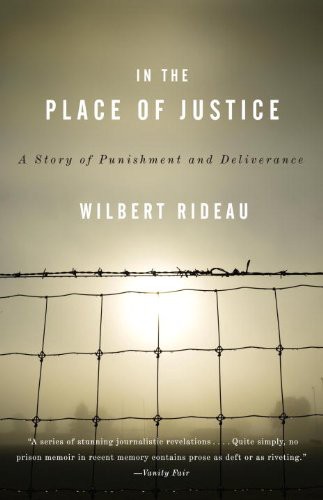
In the Place of Justice
A Story of Punishment and Deliverance
کتاب های مرتبط
- اطلاعات
- نقد و بررسی
- دیدگاه کاربران
نقد و بررسی

March 22, 2010
A death row inmate finds redemption as a prison journalist in this uplifting memoir. In 1961, after a bungled bank robbery, Rideau was convicted of murder at the age of 19 and received a death sentence that was later commuted to life in prison at Louisiana's Angola penitentiary, then the most violent in the nation. Against all expectations, his own included, he turned his up-to-then cursed life around, becoming editor of the prison newsmagazine, the Angolite,
and an NPR correspondent who published nationally acclaimed articles on prison violence, rape and sexual slavery, and the cruelty of the electric chair. Rideau frames his 44-year fight to get his conviction reduced to manslaughter and win parole (he succeeded in 2005) as a black man's struggle against a racist criminal justice establishment. More inspiring is his self-reclamation through tough, committed journalism in an unpropitious setting where survival required canny alliance building against predatory inmates and callous authorities alike. To a society that treats convicts as a worthless underclass, Rideau's story is a compelling reminder that rehabilitation should be the focus of a penal system. 16 pages of photos; 2 maps.

February 15, 2010
The life story of the author, who spent 44 years in prison thanks to an inept, often racist Louisiana criminal-justice system.
That's not to say Rideau was a wrongly imprisoned innocent. In 1961 he was an angry 19-year-old who robbed a bank in Lake Charles, La., and took three employees hostage. When a hostage bolted from his car, he panicked, shooting one and stabbing another. The Louisiana jury that freed him in 2005 determined that his lack of premeditation merited only a manslaughter charge, but at the time he was charged with murder, after a biased trial in which prosecutors claimed he conducted a cold-blooded killing execution-style. The book is a testimony to his hopeful temperament, as well as a glimpse into the complex and violent society inside Louisiana prisons. His writing on prison rape, racism and poor management is firmly objective without being bloodless, reflecting the author's work as a staffer and eventual editor of the Angolite, the magazine published at Louisiana State Penitentiary (aka"Angola"). Under his stewardship, the Angolite exposed numerous serious flaws in the prison system, such as routine electric-chair malfunctions, and Rideau's reporting earned him national attention and mainstream journalism awards. In some ways the book more closely resembles the memoir of a media mogul than a prison memoir—its pages chronicle numerous tussles between prison authorities over what he could and could not publish. Though the narrative is stuffed with detail about legal points regarding his trials, Rideau isn't narcissistic. He gives plenty of attention to the difficulties that prisoners suffered, and how much damage law-and-order Louisiana politicking—and well-meaning activists—could do to their morale. His deepest respect is reserved for his girlfriend (now wife) Linda, who spent more than a decade working toward his release. The brief closing chapter emphasizes how much freedom transformed him, as the narrative shifts from legal concerns to navigating supermarkets, caring for his cats and starting a new life.
An inspiring but never saccharine study of one prisoner's redemption.
(COPYRIGHT (2010) KIRKUS REVIEWS/NIELSEN BUSINESS MEDIA, INC. ALL RIGHTS RESERVED.)

April 1, 2010
In 1961, Rideau, a disillusioned African American 19-year-old high school dropout, attempted robbery, panicked, and killed a white bank teller. A secret police camera recorded his confession and then broadcast it via a local television station. Rideau was sentenced to death in a segregated town by an all-white jury. While inside a violent high-security Louisiana prison, Rideau taught himself journalism and went on to win numerous prestigious awards for his work. In 1993, "Life" magazine declared him "the most rehabilitated prisoner in America." Although other convicts accused of similar crimes were regularly granted clemency after a decade, Rideau remained incarcerated for more than 40 years. Here he tells his story. VERDICT Unlike most prison memoirs (e.g., Nathan McCall's "Makes Me Wanna Holler"), Rideau does not dwell on the sensational nature of his crime and instead tells his tale factually in the mellow and precise tone of an intellectual. His superhuman patience and insistence on willing his freedom through legal means are inspirational. Readers of all kinds will appreciate his large heart and thoughtful insights into the machinations of the criminal-justice system in America.April Younglove, Rochester Reg. Lib. Council, NY
Copyright 2010 Library Journal, LLC Used with permission.

May 15, 2010
With probing intelligence but only a ninth-grade education, Rideau honed his acclaimed journalism skills inside Louisianas notorious Angola prison. In 1961, at the age of 19, he killed a white woman in the course of a bank robbery. Sentenced to death, he was eventually given a life sentence after repeated appeals based on irregularities in his trial and national changes in policy regarding the death penalty. Rideau suffered years on death row and in solitary; once integrated into the broader population, he worked his way onto The Angolite, the prison publication. Eventually becoming editor, he earned the respect of the warden, prisoners, guards, as well as the broader journalism profession, with expos's of the politics and economics of the prison system, earning several prestigious press awards along the way. He struggled with journalistic principles in a highly charged environment in which all sides were hyperpartisan and often violent. After 44 years and scores of appeals lost to political machinations, Rideau was finally freed in 2005. This is more than a prison memoir; it is a searing indictment of the American justice system.(Reprinted with permission of Booklist, copyright 2010, American Library Association.)

























دیدگاه کاربران